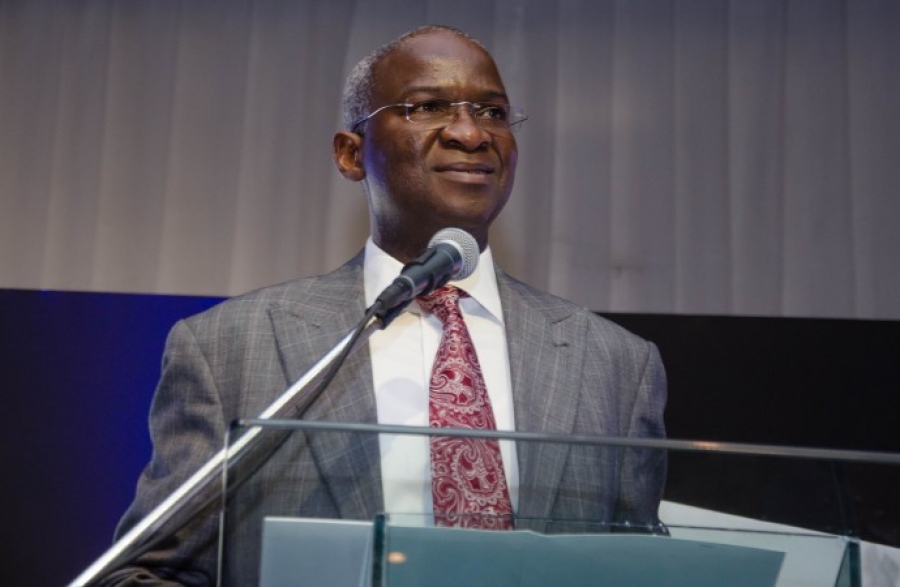- FG’ll Start Scheme to Support Power Distributors – Fashola
The Minister of Power, Works and Housing, Mr. Babatunde Fashola, has said the Federal Government will start supporting electricity distribution companies by the end of this year as part of efforts to achieve incremental power supply in the country.
Fashola stated this on Monday in Lagos during the inauguration of the new 2x60MVA, 132/33KV transmission substation at Odogunyan in Ikorodu.
He said the transmission sector of the power value chain had been one of the beneficiaries of President Muhammadu Buhari’s charge of project completion and inauguration.
The minister stated, “Over the last few weeks and months, whether it is in Sokoto or Lagos or Asaba or Umahia, and recently in Apo in Abuja, we have been very busy completing one transmission project or expanding one transmission project here and there, and we are not done yet; we have only just started.
“I can tell you that in the course of this year, the TCN has no less than 90 projects of substation completion, substation expansion and re-conducting of old lines in order to expand the grid capacity.”
He said the administration had increased the grid capacity from 5,000 megawatts in 2015 to over 7,000MW.
The minister noted that the new substation in Odogunyan had increased the transmission capacity of the TCN in the Lagos region by 120MVA.
“We have built here enough capacity and some redundancies for Ikeja Electric to provide power to end-users. This is a big handshake between the TCN and Ikeja Electric,” Fashola added.
He said communities in Odogunyan, Agodo, Cantonment, Fakale, Ita Elewa, Odonla, Odokekere, Agbede and Ogijo as well as industries would benefit from the new substation.
Fashola stated, “Slowly but surely, this will translate into jobs. What it will do is that it will improve the quality, stability and the quantity of power that these communities are experiencing and will experience, and this is consistent with the first leg of our power road map, which is to give you incremental power.
“Towards the end of the year, our distribution expansion programme should have kicked in, and that is where we will be supporting the distribution companies to improve their capacities in the last mile that comes to your homes, farms, shops and schools.”
He said the Rural Electrification Agency had completed 131 rural electrification projects nationwide, adding, “We are getting the Discos now to start connecting those assets to their grid.”
Fashola noted that when he took office as minister, there were 805 containers where all the equipment needed to complete some of the transmission projects across the country were stored.
He added, “Those containers were in your ports for 10 years. You know why the containers were in the ports? Because your government did not pay the contractors; they did not pay the clearing agents and the shipping companies.
“The Buhari government provided a budget in 2016 and 2017 and budgeted for the payment of those long-standing debts and today, we have recovered over 502 containers from the ports. Those containers have gone to construction sites.”
The Odogunyan substation is part of the contract awarded to Laga Cepower in 2009 by the TCN. The contract had four projects, namely, Ayobo 2x60MVA, 132/33Kv new substation, 132Kv D/C Bay Extension in Ikeja West, 132Kv D/C Transmission Lines and Odogunyan 2x60MVA, 132/33Kv new substation. Three were successfully inaugurated in May 2015.

 Billionaire Watch3 weeks ago
Billionaire Watch3 weeks ago
 Startups4 weeks ago
Startups4 weeks ago
 News4 weeks ago
News4 weeks ago
 News4 weeks ago
News4 weeks ago
 Bitcoin4 weeks ago
Bitcoin4 weeks ago
 Naira4 weeks ago
Naira4 weeks ago
 Forex3 weeks ago
Forex3 weeks ago
 Treasury Bills4 weeks ago
Treasury Bills4 weeks ago

























